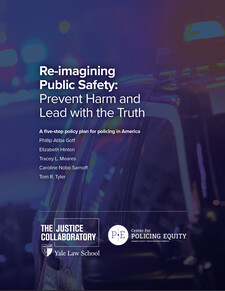Justice Collaboratory, Center for Policing Equity Release 5-Step Policy Plan
The Justice Collaboratory at Yale Law School and the Center for Policing Equity have released a five-step action plan to reform policing in America. Titled “Re-imagining Public Safety: Prevent Harm and Lead with the Truth,” the plan details a set of recommendations backed by data and experience that will enhance law enforcement legitimacy and foster public trust. It is being released in advance of the 2020 Presidential Election with the goal of making these important concepts part of the ongoing national dialogue.

“It’s time we told the truth about criminal justice reform. The system is massive, complex, and often doesn’t align with the values of officers or community members,” said Dr. Phillip Atiba Goff, President and Co-founder of Center for Policing Equity and one of the authors of the plan. “To fix the system, we’re going to need bold ideas that have the best chance of causing collateral good."
“We must move the conversation concerning police reform away from worn out crime control strategies (including implementing better or more humane ways to carry out the older vision) and instead invest in building trust and legitimacy in the system as a whole,” said Tracey L. Meares, Professor at Yale Law School and a Founding Director of the Justice Collaboratory at Yale.
The action plan focuses on four core principles — safety, dignity, parsimony, and equity. Under that framework, the authors detail five actionable steps they believe should lead the charge towards re-imagining public safety.
- Law enforcement setting a new standard that focuses on building public trust
- Federal Government facilitating the culture change by incentivizing procedural justice programs
- Law enforcement agencies measuring and managing police behavior through data
- Law enforcement and communities coming together to reconcile past harms
- Creation of a National Review Board framework to address negative policing events
The authors of the action plan include leading scholars and thought leaders of police reform, including Phillip Atiba Goff, Professor at John Jay College of Criminal Justice and co-founder and President of the Center for Policing Equity; Elizabeth Hinton, Associate Professor at Harvard University; Tracey L. Meares, Professor at Yale Law School and a Founding Director of the Justice Collaboratory at Yale; Caroline Nobo Sarnoff, Executive Director of the Justice Collaboratory; and Tom R. Tyler, Professor at Yale Law School and a Founding Director of the Justice Collaboratory. Together, the authors have served as members of presidential task forces, led national initiatives to build trust in the police, developed groundbreaking police trainings, created revolutionary data analytic techniques for police accountability, and studied the history of racism and incarceration in the United States. As contributors and collaborators on a series of task force, research, and policy reports, their expertise and subsequent publications serve as a significant foundation for re-imagining public safety. To review additional studies and reports the authors cite in “Re-imagining Public Safety: Prevent Harm and Lead with the Truth,” visit the Justice Collaboratory’s Public Safety Policy website.
The Justice Collaboratory is an interdisciplinary group of scholars at Yale University and beyond working to develop new theories and conduct original empirical research to improve the criminal justice system.
Center for Policing Equity (CPE) is an independent research organization that is eliminating bias in policing by measuring it. Using advanced analytics, the organization can diagnose disparities in policing to create pathways for social, cultural, and policy change.


